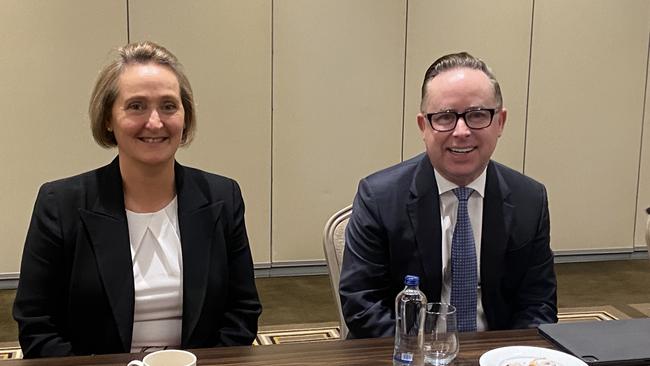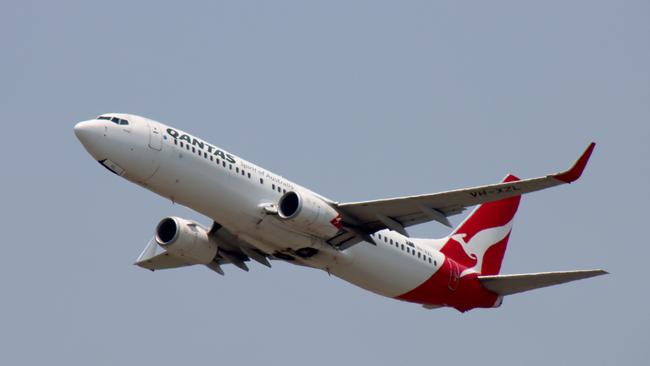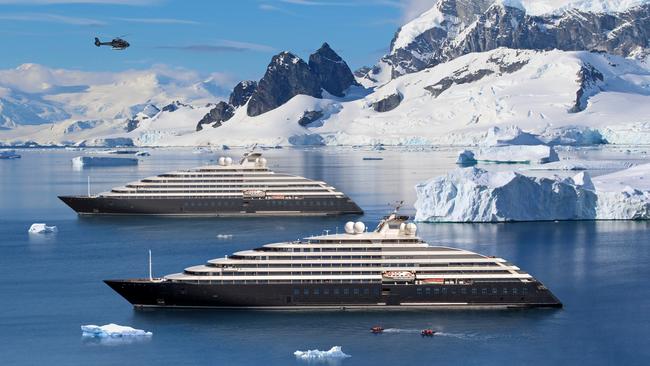Alan Joyce reveals plan for life after Qantas
Qantas boss Alan Joyce has outlined plans to literally sail off into the sunset when he exits the airline in November after 15 years in the top job.
Qantas CEO Alan Joyce has revealed plans to literally sail off into the sunset when he leaves the airline later this year after 15 years in the top job.
Speaking on the sidelines of the International Air Transport Association AGM in Istanbul, Mr Joyce said the only thing he currently had planned post-Qantas was a cruise around the Antarctic.
“I’m going to take six months off, decompress, not make any decisions, go for a cruise around the Antarctic believe it or not, go well away from any aircraft and then make my mind up about what I want to do after that,” Mr Joyce said.
He was joined in Turkey by CEO-designate Vanessa Hudson, as well as chief customer officer Markus Svensson and sustainability chief Andrew Parker.
Qantas is currently searching for a replacement for Ms Hudson as chief financial officer and revealed there was no shortage of interest from people wanting to work for the airline.
Mr Joyce said they had received a breathtaking 161,000 applications for 7000 jobs since Qantas ramped up its operations post-Covid, many of those from overseas, including pilots wanting to come home.
More fleet changes have been flagged with Qantas set to start the process of seeking a replacement aircraft for its ageing A330 fleet in the second half of the year.

Ms Hudson said she was confident market conditions were ripe.
“The one thing we are hearing from speaking to the manufacturers and other airlines is there is significant demand for widebodies,” Ms Hudson said.
“It is very important we negotiate the best outcome for Qantas.”
She said the 24 A330s, with an average age of about 19 years would be replaced over the next decade, along with the airline’s 10 A380s.
An order for 12 A350-1000s was currently lodged with Airbus, which would operate the airline’s ultra long haul Project Sunrise flights from 2026.
Boeing 787-9s would cover other international routes, with Qantas keen to add more non-stop flights to destinations such as Chicago, Seattle and Paris.
Short to medium-haul flights would increasingly be flown by narrow body aircraft with new A220s and A321XLRs set to provide more flexibility in the fleet due to their longer range.

Next generation aircraft also offered the prospect of reduced emissions and a lower fuel burn, as Qantas worked towards its goal of using 60 per cent sustainable aviation fuel (SAF) to power its aircraft by 2050.
To that end, Mr Parker reiterated Qantas’s push for the Australian government to introduce a SAF mandate for airlines as a further stimulant to the almost non-existent industry.
While Qantas was investing heavily in projects to address the vacuum, Mr Parker said government intervention was needed.
“Japan has just launched a mandate of 10 per cent SAF for domestic and international airlines by 2030,” Mr Parker said.
“It is unusual for airlines to call for policy intervention by government but this is a nascent industry, it calls for policy intervention.”
To date Qantas has signed an agreement with the Queensland government to develop a local SAF industry, and is providing funds for a feasibility study into a biorefinery using alcohol to fuel technology.

Mr Parker said they had also extended a contract to buy SAF at Heathrow in London, which would amount to about 15 per cent of fuel needs on flights from the UK.
Currently between two and nine-times more expensive than fossil-based jet fuel, Mr Parker said passengers and corporates would soon have the option to contribute to the cost of SAF.
“It’s essentially a tick the box situation, and there’s an explanation about where your support will go to — is it carbon offsetting or support of SAF in Australia,” he said.
The IATA AGM was considered an opportunity for Ms Hudson to meet with other airline CEOs before she takes over from Mr Joyce at the airline’s annual general meeting in November.
The appointment will see three of Australia’s major domestic carriers led by women, with Steph Tully heading up Jetstar and Jayne Hrdlicka running Virgin Australia.
Ms Hrdlicka was keeping a relatively low profile in Istanbul, her first major engagement since the tragic death of her husband Jason Gaudin.
Ms Tully was not attending the AGM, which was explained by the fact there was typically a rotation of executives each year.
After just six months in the role, it was understood Ms Tully was focused on improving Jetstar’s performance following a struggle to reduce flight delays and cancellations.
Mr Joyce stressed Qantas was now exceeding its pre-Covid operational performance and said the amount of unused travel credits was falling each month.
Earlier this year, Qantas held $800m in credits issued to customers whose flights were cancelled during the Covid pandemic.
The credits will expire if not used for a flight booking by the end of the year, and Mr Svensson said Qantas was issuing regular reminders to those customers to make use of them.
The writer is in Istanbul as a guest of IATA







To join the conversation, please log in. Don't have an account? Register
Join the conversation, you are commenting as Logout